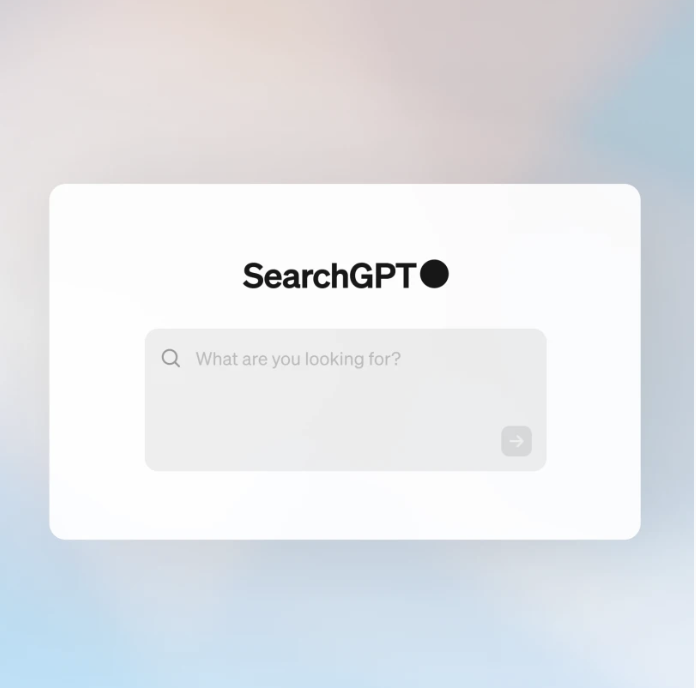The future of search. The latest insights from our SearchGPT research.


Just last week, OpenAI widely released its first search engine, SearchGPT, shaking up the AI search landscape with an emerging competitor. Some label it a ‘Google killer,’ while others anticipate it will disrupt the search engine market once again—remember Bing when it launched its Generative AI features?
In our latest analysis, we compared the rankings of 100 keywords across SearchGPT, Google, and Bing, revealing interesting insights into how these search engines differ and what this means for your SEO strategy. Keep reading to dive into our key findings and actionable recommendations from our latest study.
TLDR
- Being in the top 3 organic rankings in Google or Bing doesn’t guarantee a spot in SearchGPT.
- Domain Authority (DA) is important in AI-driven searches. (Isn’t it about time we invest more in natural link building?)
- For GPT, the length of content matters more than in Google’s organic search results. Words are our allies!
- No need to overload your page titles and H1 headings with keywords. The essence of AI search hasn’t changed.
Findings:
We analysed 100 keywords across 19 different industry sectors, comparing the top 3 organic positions in SearchGPT, Google, and Bing. And here’s what we found.
SearchGPT seems to rely on previous Google ranking signals, specifically pre-Core Web Vitals. Sounds nostalgic, doesn’t it?
Domain authority and the length of content seem to matter more, as we found them to be significant factors influencing top ranking positions.
Also, pages that rank first in Bing have a slightly higher chance of showing up in SearchGPT results than those ranking first in Google. But this does not guarantee top rankings on SearchGPT.
Our findings only suggest that the Bing indexing plays an important role in the SearchGPT ecosystem, as confirmed by OpenAI’s VP of Engineering. So if you currently want to rank in ChatGPT Search, your site pages will likely need to be indexed by Bing.
“ChatGPT appears to use ranking signals similar to Google ranking algorithm (pre-Core Web Vitals).”
Emma Thompson, Organic Lead
“SearchGPT ranking signals being closer to pre-CWV Google ranking signals would make sense, as recent algorithm updates have centred so much around making search experiences more human. AI doesn’t need content to be helpful, succinct or on a page that page loads quickly every time.
I wouldn’t bank on it staying this way forever though, especially with concerns around accuracy of information and AI hallucinations. I’d personally like to see EEAT factors as a ranking signal for SearchGPT in a near update.”
Comparative Search Engine Data
Only 19% of the results overlapped between position 1 in Google and SearchGPT sources, while there was a 26% overlap between position 1 in Bing and SearchGPT. This means that SearchGPT had slightly more sources matching Bing’s top results than with Google’s.
Just 7% of position 1 in Google matched SearchGPT’s position 1. In comparison, there was a 10% position 1 match between Bing and SearchGPT. This suggests that there is a slightly higher overlap between Bing and SearchGPT. However, it’s important to note that almost 90% of SearchGPT’s top results didn’t match either Google’s or Bing’s top results.
SearchGPT Ranking Factors
Domain authority matters
Domain authority (DA) emerged as a key factor in determining SearchGPT rankings. In our analysis, we found that for 60.2% of searches, SearchGPT referenced sources with the highest DA in position 1. The average DA for pages that secured the first position in SearchGPT was 74. In contrast, the average DA for Google’s organic position 1 was slightly lower at 65.
These findings suggest that AI search engines like SearchGPT may consider DA more than traditional search engines. It also highlights the importance of building a strong domain authority to achieve top ranking positions in AI-driven search results.
Word and sentence count
Our analysis also revealed insights about the influence of word and sentence count on SearchGPT rankings. For Position 1, SearchGPT sourced pages with an average of 574 words and 102 more sentences than Google’s top rankings. This suggests that the AI search engine prioritises longer content over shorter content.
SearchGPT loves words. It showed a clear preference for pages with higher overall average word counts in positions 1 to 3. It also ranked the wordiest article in position 1 nearly 65% of the time. This differs from Google’s approach, where higher average word counts appear in reversing order—Position 3, Position 2, and then Position 1.
When looking at the total word count, the trend is the same—SearchGPT seems to favour longer content more than Google. Nearly 55% of the time, the new AI search engine chose articles with more words than Google as its top ranking source. However, this preference decreased as we moved down the rankings, with GPT sourcing long-form articles only 39.66% of the time by Position 3.
Page speed
When we looked at page speed for pages that ranked in positions 1-3, we found that Google does, in fact, rank sites with faster loading times. The search engine giant also selected the quickest page for the top position 80% of the time.
SearchGPT exhibited a different pattern. It sourced articles with faster page speeds further down the line and in reverse order—Position 3 had the highest page speed scores, then Position 2, and then Position 1. SearchGPT only chose the fastest page for the first position, only 56% of the time.
This suggests differences in how search engines prioritise page speed. Google clearly places a greater emphasis on it, as it has for some time, particularly since the introduction of Core Web Vitals.
Exact keyword match in titles
Our study found that exact keyword matches in titles appear to have little to no impact on ranking first in both search engines. Both Google and SearchGPT only ranked pages with exact keyword matches about 5% of the time.
This suggests that using exact keywords in titles or headings does not significantly improve site rankings in both AI-driven and traditional search engines. Also, keyword stuffing, or the excessive use of keywords in content, can do more harm than good. So, don’t stress over exact matches with keywords in titles.
Strategic implications
Despite the emergence of SearchGPT, Google is considered a search engine giant, and for a good reason. It still holds 89% of the search engine market share worldwide. This means that following Google’s SEO guidelines is still essential for organic rankings, particularly in terms of helpfulness, as well as technical aspects such as page speed and user experience.
However, the search landscape is evolving, and a potential future shift could see AI-driven models like SearchGPT and Perplexity capturing a significant share of the search market. As generative AI models continue to improve, AI search engines may become increasingly good at delivering nuanced and personalised responses to user enquiries. This could draw users away from traditional search engines, shaking up the entire search engine market for years to come.
“Current recommendation: Continue optimising for Google as it maintains market share.”
Jodie Brookton, Strategic Director
“SearchGPT is bringing fresh energy to search, but Google is still the heavyweight champ. However, if your target audience includes younger, and/or tech-savvy users, staying ahead of the game with AI-driven search strategies could be a smart move. As these users increasingly turn to AI for answers, adapting your SEO approach now could position you to capture this growing segment and future-proof your brand in an evolving search landscape.”
Actionable recommendations
In light of the shifting search landscape and emerging trends in AI search engines like SearchGPT, it’s essential to adapt business SEO strategies. Here are some actionable recommendations to keep your digital marketing efforts aligned with the evolving market dynamics:
- Your site’s robots.txt file should allow ‘OAI-SearchBot’ while keeping separate permissions for each OpenAI crawler. OAI-SearchBot is the web crawler specifically for indexing on SearchGPT.
- Links play a crucial role in increasing Domain Authority. Prioritise building a diverse range of high-quality, natural backlinks.
- Create helpful content that is authoritative and relevant to your industry. Add value to your target audience, not search engines.
- Build a good site structure, including internal linking, that is easy for users to navigate and search engines to crawl.
- Fix any technical issues related to site health and page speed.
- Monitor changes in search engine algorithms to adapt to changing ranking factors.
- Review and redefine success metrics to account for potential changes in search engine market share.
“Domain authority is more important than ever. You need to work on natural link building as a priority.”
Claudia Taylor, Organic Lead
“Domain authority has always been an important pillar of SEO, but it’s now more vital than ever. We always recommend organic link building or digital PR to be part of your SEO strategy, but it should now be a priority. I can predict this area of SEO will grow significantly as a result.”
Future Considerations
Microsoft’s bold move to invest in ChatGPT suggests possible opportunities for future monetisation. This could mean the introduction of personalised advertising, tiered subscription models, or AI-powered enterprise solutions. For businesses, this could mean new ways to connect with audiences, as well as tap into existing market opportunities.
As AI continues to evolve, businesses that adopt it strategically could gain a significant competitive edge, while those that resist may find themselves left behind in an increasingly AI-driven world of today, and tomorrow.
“Microsoft’s investment in ChatGPT suggests possible future monetisation.”
Richard Harvey, Senior Performance Consultant
“Microsoft’s $11 billion+ investment in OpenAI suggests they’ll monetize GPT Search when it becomes available to free users in the coming months, following suit with Perplexity’s planned ads launch in Q4 2024.
It’ll be interesting to see if GPT ads serve only free users, or also extend to paid users (primarily B2B), creating new opportunities for targeted advertising.”
Curious about how SearchGPT might impact your organic rankings? Wondering how to improve your SEO strategy? We’re here to help!
How can we help you?
We nurture great brands to achieve more. If you need an agency partner with heart as well as brains, we’d love to chat.


